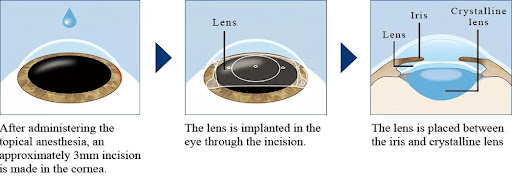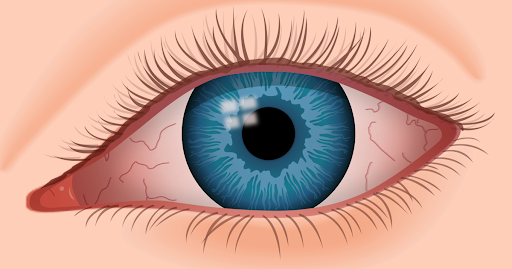Ocular migraine is an episode of vision loss that typically occurs in one eye. It is characterized by flashing, flickering, or shimmering that can create a blind spot in your vision field.
Also called retinal migraine, ocular migraine primarily affects our vision, conjuring up intricate patterns and shapes that can be intriguing and concerning. Untreated ocular migraine goes beyond visual disturbances; they can profoundly impact the overall quality of life. It is imperative to seek immediate medication from a proven and tested eye center like Eyeonce Eye Clinic.
Causes and Risk Factors
Here is a comprehensive breakdown of what contributes to ocular migraines:
Causes
- Blood vessel changes – Ocular migraines are often linked to blood vessel changes in the retina or the back of the eye. These changes can disrupt blood flow and lead to visual disturbances.
- Spreading cortical depression – It is like a temporary glitch in the brain’s visual processing system that causes disruptions in nerve cell activity, resulting in visual symptoms characteristic of ocular migraines.
- Neurotransmitter imbalances – These imbalances affect how nerve cells communicate and process information, triggering abnormal firing patterns in the brain’s circuits. It can result in visual disturbances such as flashing lights, zigzag lines, blind spots, or shimmering patterns
Risk Factors
- Migraine history – Individuals with migraines are at an increased risk of developing ocular migraines. Those who previously experienced migraines with aura are more likely to encounter ocular migraines due to shared underlying mechanisms.
- Family history – If ocular migraine or other types of migraines run in your family, you risk experiencing them. This familial link suggests that genetic factors contribute to the susceptibility to these episodes.
- Hormonal fluctuations – Hormonal changes can disrupt the delicate balance of chemicals in the brain and increase the likelihood of experiencing migraines, including those that affect the eyes.
- Stress and fatigue – Stress can disrupt neurotransmitter balance and increase the risk of experiencing ocular migraine episodes.
- Certain foods – Food containing additives like monosodium glutamate (MSG) can influence brain chemistry and trigger migraines, with ocular symptoms being part of the spectrum.
- Sensory stimuli – Certain sensory stimuli, such as bright lights, loud sounds, and strong odors, can overstimulate the brain’s sensory centers and provoke migraine episodes accompanied by visual disturbances.
Ocular migraine can be a downright unsettling experience; seeking professional help from an experienced eye doctor like Dr. Paik Dong Won or Dr. Jung Sae Rom can help identify the different causes of your ocular migraine and provide appropriate treatment.
Symptoms
Ocular migraine has distinct symptoms affecting an individual’s overall eye vision.
- Flashing lights – They appear as flashing or flickering lights resembling lightning bolts. These lights appear in various shapes and sizes and may move across the visual field.
- Zigzag patterns – These zigzag lines or patterns seem to shimmer, appear in various colors, and may move or expand.
- Blind spots – Scotomas—also known as temporary blind spots, can occur in the vision field during ocular migraine and may last minutes to an hour.
- Blurry vision – During ocular migraine, objects may appear hazy or out of focus, impacting visual clarity.
- Visual aura – These auras appear to be sudden bursts of light akin to camera flashes. They often precede an ocular migraine, lasting around 20 minutes to an hour.
Other ocular migraine symptoms include vision loss, headache, or feeling sick. To ensure your symptoms are adequately studied, visit Eyeonce Eye Clinic in Gangnam District, Seoul, South Korea. With Eyeonce’s expert ophthalmologists, state-of-the-art equipment, and customized treatment options, you will surely experience nothing but the best.
Diagnosis and Treatment
Here is the comprehensive process of how Eyeonce manages ocular migraines:
Diagnosis
- Clinical evaluation – This is where our eye care professional asks about your medical history, discusses your symptoms, and performs relevant tests.
- Diagnostic tests – These tests include a visual field test, eye exam, and imaging studies to rule out other potential causes of visual disturbances like retinal issues or other eye conditions.
- Migraine history – Sharing your experiences and any visual disturbances during previous migraine episodes can aid in diagnosis.
You will also be asked to describe the specific aura patterns you experience and discuss potential triggers like certain foods, stress, and sensory stimuli. Doing so can aid in proper diagnosis and treatment.
Treatment Options
- Medications – If your ocular migraine episodes are frequent or disruptive, medications such as pain relievers, anti-nausea, or preventive medications can be prescribed.
- Relief techniques – At Eyeonce, our eye care professionals will introduce ocular migraine relief techniques like applying a cold compress and more to alleviate discomfort.
- Trigger management – Avoiding triggers (if identified) can play a crucial role in preventing ocular migraines.
Our eye doctors at Eyeonce Eye Clinic will also impose lifestyle modifications such as having adequate sleep, a healthy diet, and stress management. They are also open to collaborating with neurologists or migraine specialists to offer diverse, specialized insights into managing ocular migraines.
Why choose Eyeonce Eye Clinic Gangnam for ocular migraine treatment?
Utmost Patient Care
Our eye care professionals and staff ensure to give you your money’s worth. We guarantee you receive the best medication possible and assure you that you are guided and understood, making you feel comfortable and confident at every step.
Comprehensive Consultation
Eyeonce Eye Clinic offers comprehensive eye examinations to evaluate your condition and determine the best eye strain treatment. Our ophthalmologists take their time to cater to your questions and address your concerns, ensuring you make an informed decision about our vision correction options.
Expert Eye Doctors
Our ophthalmologists, Head Director Dr. Paik Dong Won and Medical Director Dr. Jung Sae Rom, are highly knowledgeable and adept in treating eye strain. They always use the latest techniques and technologies to ensure optimal results.
Frequently Asked Questions (FAQs)
Ocular migraine typically affects only one eye.
Ocular migraines are not considered severe but can indicate an underlying health condition. Consulting a healthcare professional is essential for accurate diagnosis and treatment.
It is highly recommended to avoid driving or operating heavy machinery during an ocular migraine episode due to potential visual impairments.
Conclusion
Ocular migraine may be perplexing, but with the proper knowledge and approach from Eyeonce Eye Clinic’s eye care professionals, you can effectively manage and navigate through it. Do not let ocular migraines dim your outlook on life. Visit Eyeonce today and consult our eye doctors to achieve a path toward visual clarity.



